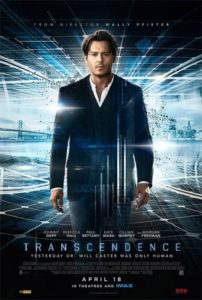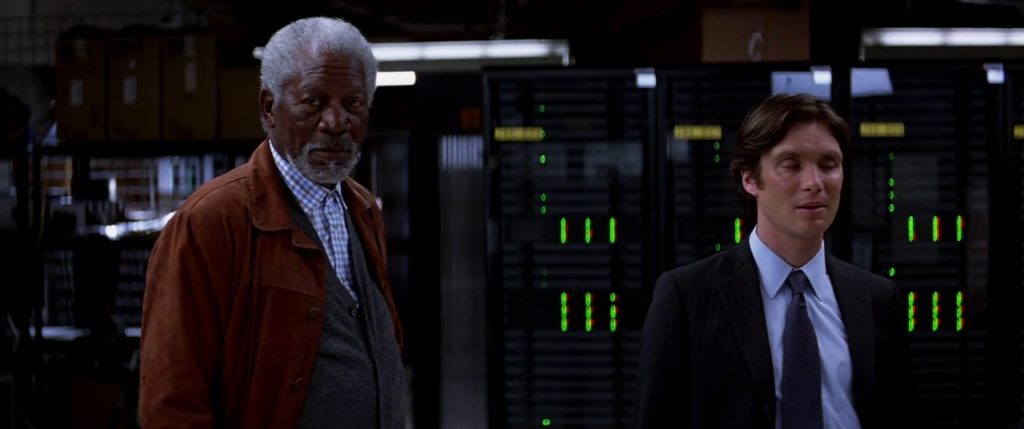Does This Take Us Beyond the Limits of Our Experience? No.
Director: WALLY PFISTER/2014
 Johnny Depp has had a recent string of poor showings at the box office lately. After experiencing a huge bomb with last year’s The Lone Ranger, as well as other flops such as The Tourist, Dark Shadows, and Rango, Johnny is looking to take us to a new place beyond his safe comfort zone of playing wacky characters in a Tim Burton film. His intended answer is the film Transcendence.
Johnny Depp has had a recent string of poor showings at the box office lately. After experiencing a huge bomb with last year’s The Lone Ranger, as well as other flops such as The Tourist, Dark Shadows, and Rango, Johnny is looking to take us to a new place beyond his safe comfort zone of playing wacky characters in a Tim Burton film. His intended answer is the film Transcendence.
As Dr. Will Castor, he is seeking to advance the scientific field of artificial intelligence along with his scientist wife, Evelyn (Rebecca Hall) and his friend and colleague, Max (Paul Bettany). When an anti-technology domestic terrorist group strikes out at him and his work by shooting Dr. Castor and destroying several labs across the country, things look bleak for the future of A.I. research, and for the couple’s chances at a future. Before dying, they make a mad-dash attempt to upload the consciousness of Dr. Castor into his advanced A.I. machine to preserve his mind and allow for the possibility of saving him in the end.
From the looks of the trailer, this film had the potential to be a big movie. First time director, but acclaimed cinematographer (think all of Christopher Nolan’s Batman films, Inception, The Prestige, as well as The Italian Job, etc.) Wally Pfister tries to have the large scale scope of the Christopher Nolan films he has worked on, but loses the emotional connection of the story in the process.
The main problems stem from trying to be too many types of movies at the same time and having very unprogressive use of technology in a film selling itself on going beyond the limits of our current technological experiences, basically transcendence.
Is it about the tragedy of the loss of one’s life partner and the desire to not let go? Is it about the hopes of science and the fallen nature of mankind? Is it an action film between the military and the “bad guy”? Is it a social commentary on our connection with, as well as our use, of technology? In Transcendence, it is all of the above.

Before being fatally shot, Dr. Castor is asked by an audience member at a symposium the often lobbed criticism about science simply creating their own god. Dr. Castor’s answer is a cynical one asking, “isn’t that what we always do?”. Whether it’s science or religion, the culprit is still man making their own gods in our own image. And so the idea of playing God, or creating a god in our own image becomes the backdrop of the entire film. Both the benefits we can find in the pursuit of science, as well as how it exposes our basic tendencies of greed, power, and selfish gain, can be found in this movie.
But the film fails to fully develop any of these themes or answer any of the questions I stated above with any real depth. They are touched upon but fall victim to the overarching need to turn this into an action film, and one that is guilty of borrowing from so many other films.

The main small town where the action takes place looks like the exact same one used in the showdown in Thor. There is even a silver oozing material that serves as the basic building blocks of life and matter much in the same way it is depicted in Prometheus. The whole premise of a man/machine gaining unlimited power and knowledge from the virtual world is ripped from the extremely dated 1992 film, The Lawnmower Man. This plot is also used, to a small degree, in this year’s blockbuster, Captain America: The Winter Soldier. Oh, and Morgan Freeman is in the film, playing a scientist that is much in the vein of his character Lucius Fox in the Nolan Batman films. Fellow Batman and Nolan alumni Cillian Murphy is also present here, in a wasted role.
The other main problem for the film is how un-advanced the technology is. I have a feeling that this film will feel very dated in the very near future. Johnny Depp himself is immersing himself into a role dripping with irony in that he has described himself as technologically inept in real life. Sadly, his disdain for technology in his personal life, is seen on screen in a very mundane and pedestrian performance. After being so over-the-top in so many of his other efforts (Pirates of the Caribbean, Edward Scissorhands, Alice in Wonderland, etc.), he is actually boring here, and if not for Rebecca Hall, I would seriously doubt that these two had any love between them despite being told how “in love” their characters are supposed to be.

This film ultimately falls short because of how much potential there was in this story to be something fresh, innovative and a timely commentary on where we are today with our technology. The disconnect is in the contrast of how powerful Dr. Castor’s ability to advance modern technology is, with our daily world of not being able to download a funny video from YouTube if our wi-fi is glitchy. There is some great theological questions contained in the film, that if explored, would have made the film an exponentially greater movie going experience. They are often implied but lose their impact with the lack of development contained in this script.
In the end, Transcendence is just another film seeking to buy success with the pedigree of its cast and crew rather than with the story it seeks to tell. With a title that insinuates that we are going to be taken on a journey forward into a realm we have never experienced, it rings even more hollow after you have seen it, knowing you have really taken a step backwards.


